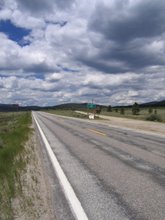But a gathering body of evidence suggests that local food can sometimes consume more energy -- and produce more greenhouse gases -- than food imported from great distances. Moving food by train or ship is quite efficient, pound for pound, and transportation can often be a relatively small part of the total energy "footprint" of food compared with growing, packaging, or, for that matter, cooking it. A head of lettuce grown in Vermont may have less of an energy impact than one shipped up from Chile. But grow that Vermont lettuce late in the season in a heated greenhouse and its energy impact leapfrogs the imported option. So while local food may have its benefits, helping with climate change is not always one of them.Eating local food has a number of benefits-- which the article points out-- but reducing energy consumption isn't necessarily one of them. (An Economist article a few months ago offers more documentation for this claim.
The environmental consumption movement in general faces a problem: we don't have a simple measure to quantify a product's impact on the environment. For instance, the production of cotton may use less energy than polyester, but because it needs more washing and longer dry cycles, over a lifetime, a cotton garment may use more energy.
I'm with economists in thinking that the price system is the best way of addressing this: let the price of a product reflect the harm it does to the environment. Tax CO2 emissions or energy use more generally. It's called a Pigovian tax.
Simple political program that everyone should support:
1) increase gas taxes and energy taxes
2) reduce income taxes progressively, so that there is no net financial impact on low-income households
Results: equivalent tax burden, lower energy usage
Simple political program that everyone should support:
1) increase gas taxes and energy taxes
2) reduce income taxes progressively, so that there is no net financial impact on low-income households

No comments:
Post a Comment